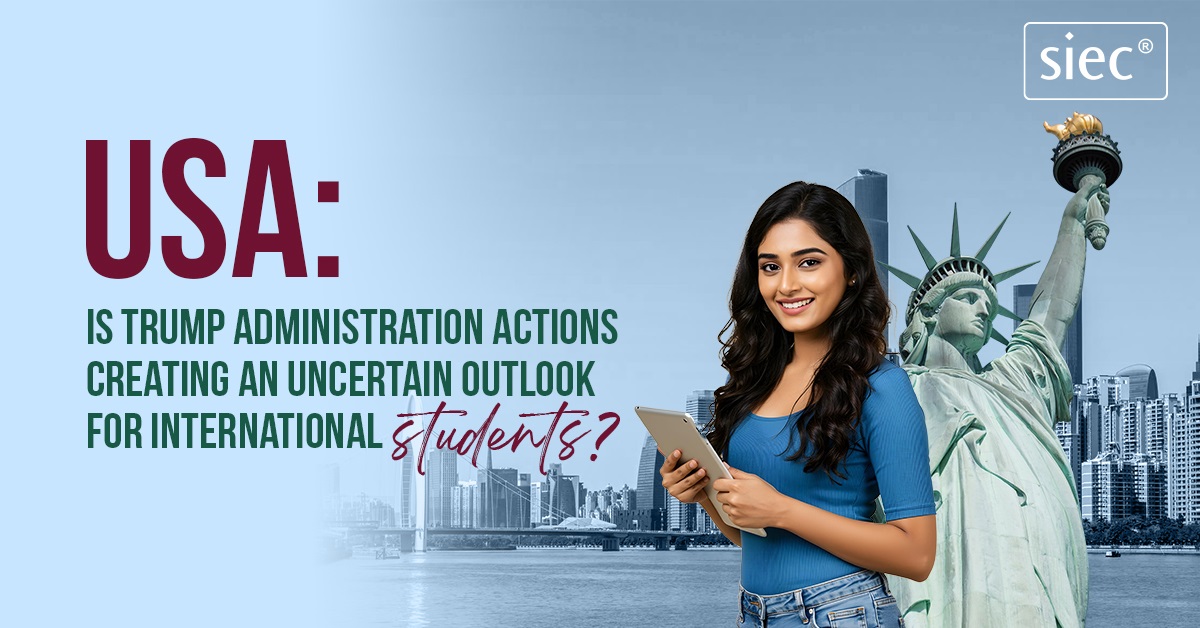
Updated On: 30 October 2025
US: Is Trump administration actions creating an uncertain outlook for international students?
Research from 2023, 2024, and 2025 reveals that international students still heard primarily good things about studying in the United States. For instance, according to a survey conducted in February 2025 by top study abroad consultants IDP, more than half of respondents claimed that their impression of the US had improved since the presidential election in November 2024.
An Interstride study conducted at the end of January and beginning of February also revealed that only 16 percent of respondents associated negative impressions of the US with the presidential election. Looking further, IIE estimates a slight increase (+3%) in international enrollments in the United States for this academic year.
And yet, while very early signs seem quite positive, indications are already growing that all will not be as rosy this year and into 2026.
Travel Ban 2.0?
Major media outlets like Reuters have started reporting that the Trump administration is putting in place plans for great restrictions on travel by the citizens of more than 40 nations, pending executive action to be taken in April 2025.
Reports have it that the travel ban will organize countries into three categories. The first grouping - which apparently includes Afghanistan, Bhutan, Cuba, Iran, Libya, North Korea, Somalia, Syria, Venezuela, and Yemen - would be completely banned from entry into the United States.
A second group - including countries like Eritrea, Haiti, Laos, Myanmar, and Sudan - would partially suspend entry for tourist and student visa classes.
A leaked memo detailing the plan showed that the third group would include up to 26 countries - such as Belarus, Pakistan, and Turkmenistan - that could consider partial suspension of visa issuance if their governments "do not make efforts to address deficiencies within 60 days."
See Also: Geopolitics Can Enhance Your Study Abroad Experience
Trump's Policies Are Making Europe the New Education Superpower
The plan and its execution may alter group classifications of individual countries before the relevant official order is issued. However, if the plan rolls out in the future, the impacts could be massive. Seven countries under a travel ban established during the first Trump presidency in 2017 decreased foreign undergraduate enrollments in the US by -2.2% and graduate student numbers by -5.5%.
It has further been evidenced that past or anticipated changes in policy in other large destination countries have significantly affected the decision-making and planning process for study in the US. Potential changes in the movement of students are enough to shake such thinking.
Cracking down on protest participants
The news about the upcoming travel ban coincides with the strange cases of foreign students being rounded up or deported by US immigration officials after taking part in pro-Palestinian protests, most notably in Columbia University.
A Note from NAFSA: "Federal immigration agents arrest an international graduate student at Columbia University, revoke the visa of another international student, and execute search warrants in student dorm rooms, causing what one law professor described as a 'palpable sense of fear' on the campus."
You might like: A Story of Learning and Growth from India to Australia
Students warned not to leave the campuses
Many other US institutions such as Cornell University, Wesleyan University, MIT, and Brown University have also urged their international students, faculty members, and staff to minimize their travel to within the US.
In an all-campus email dated 16 March, the university's executive vice president for planning and policy named Russell Carey said, "Out of an abundance of caution, we encourage international students, staff, faculty and scholars-including U.S. visa holders and permanent residents (or 'green card holders')-to consider postponing or delaying personal travel outside the United States until more information is available from the U.S. Department of State. Potential changes in travel restrictions and travel bans, visa procedures and processing, re-entry requirements, and other travel-related delays may affect travelers' ability to return to the US as planned."
The email was triggered in part by "concerning reports affecting our own community of a couple of individuals refused entry upon returning to the United States after international travel and compelled to immediately depart."
Read this also: Why European Universities lead in affordable education and career growth?
Proposed Legislation to Bar Chinese Students
Meanwhile, a group of Congressmen has also introduced legislation that aims to bar student training for Chinese nationals in the United States on the pretext of national security.
According to Congressman Riley Moore, the main sponsor of the bill: "Every year we allow nearly 300,000 Chinese nationals to come to the U.S. on student visas. We have literally invited the [Chinese Communist Party] to spy on our military, steal our intellectual property, and threaten national security. Last year alone, the FBI charged five Chinese nationals here on student visas after they were caught photographing joint US-Taiwan live-fire military exercises. This can't go on... Congress must stop China's exploitation of our student visa program. It's time to turn off the spigot and immediately ban all student visas going to Chinese nationals."
Funding on the line
On February 13, 2025, the US government announced the suspension of all programmes under the State Department's Bureau of Educational and Cultural Affairs (ECA) for an initial period of 15 days.
Funding freeze is still continuing, and it affects several of international education permissions in the US. Most of all, more than 10,000 students and professionals who joined international exchanges – some American, and others from other countries – experienced their grants getting dried up. They were not notified when – as well as if – the funding for the programs will be reinstated.
As Inside Higher Ed states, "The pool of US international applicants has changed significantly since the pandemic. The volume of students from China has decreased while enrolment from countries like Bangladesh, Ghana, and especially India — which rose by 23% last fall — has surged. International enrolment has also shifted from undergraduates to graduate students pursuing not just degrees but long-term research, work and life in the US…[Therefore], recent shifts in international applicant profiles could exacerbate the political blowback on enrolment. The Trump administration froze or eliminated hundreds of millions of dollars in federal research grants for universities this month. For today's new international students, research and programme funding is 'the major draw,' and the grant cuts have left international graduate students wondering if they'll be able to afford their degrees after all."
See this also: What career paths are open to international students in France?
What is the larger import of all this?
Clearly, the compendiums of funding have already affected some students, and some students at least will feel miserable traveling to and from the United States. Depending on how readily travel restrictions under this prospective ban will apply, many more students or prospective students should be affected fairly soon.
If anything was learned from the early introduction of new policy settings in Australia, Canada, and the United Kingdom, it is that both rules and confusion or expectation regarding them generate student movement. The impact would seeminly be lesser with such students already well advanced in plans for 2025. There could be, however, more about US immigration proposals and legislation making a difference as early as 2026 and beyond.
You may like: QS World University Rankings: Sustainability 2025 Revealed
Conclusion
Reach out to SIEC for Application inquiries and assistance.
Read more insightful articles:
CBIE launches action plan for International Education
Interest to Study Agriculture Abroad rises among Indians
Degrees That Will Be in Demand in 2027
UAE rolls out New visa-on-arrival Policy for Indians
New Eligibility Requirements for Canada Post Graduation Work Permit Program



Comments (0)
Leave a Comment